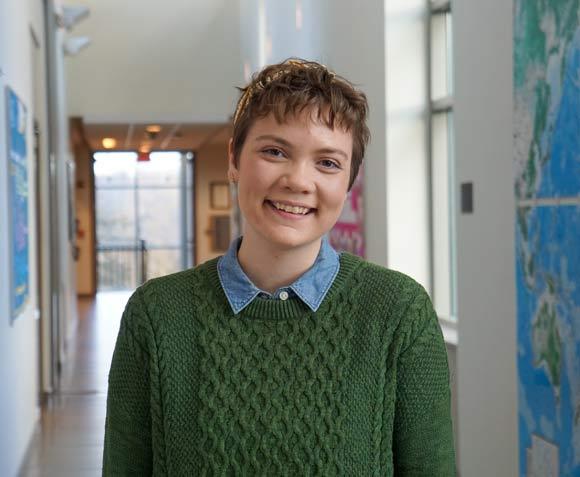* Denotes requirement for the major
# Fulfills Sophia requirement (please see College Bulletin for details)
#103 Lives and Times — 3 credits
This introductory course explores the interaction of major historical figures with their cultural milieu through a study of works that have cultural or historical importance.
#197 (In)famous Women: Myth, Legend, and History — 3 credits
This course studies the ways that people talk about their past through myths, legends, and history, by focusing on subjects such as Adam and Eve, Cleopatra, female saints, Eleanor of Acquitaine, Joan of Arc, and Isabella of Spain.
#203 East Meets West — 3 credits
An introduction to encounters between and mutual influence of western cultures and the cultures of China, Korea, and Japan. Texts include travel accounts and translations of Asian literature.
#205 History of Famous Women — 3 credits
This course looks at the lives of women such as Joan of Arc, Elizabeth I, and Abigail Adams, and places them in the tradition of exceptional women. It examines that tradition as a form of both women’s history and feminist argument,from Roman antiquity to the present.
#212 High Society — 3 credits
A social and cultural history of the European aristocracy and monarchy, from the Middle Ages to the present.
#292 Greek and Roman Culture — 3 credits
This course looks at the main elements of Greek and Roman culture through a variety of works, historical, philosophical, and literary. Special attention is paid to the role of women in Greek and Roman society.
*321 Cultural History I: Ancient and Medieval Culture — 3 credits
A political, intellectual, and artistic history, from Greco-Roman antiquity to the High Middle Ages, focused on Europe with special attention paid to the role of Christianity. Topics include the “golden age” of Athens, the cultural influence of the Roman Empire, the rise of Christianity, monasticism, the world of the warrior aristocracy, the medieval world view, the rise of royal government, the twelfth-century cultural revolution, and Gothic architecture. Corequisite: HUST 323.
*322 Cultural History II: Medieval and Renaissance Culture — 3 credits
A political, intellectual, and artistic history, from the Late Middle Ages to the Italian Renaissance, focused on Europe with special attention paid to the role of Christianity. Topics include the Black Death and its impact, the power of Italian city-states, Renaissance humanism, the cult of the individual, the discovery of the New World, and the evolution of Renaissance art. Corequisite: HUST 324
*323 Colloquium I: Ancient and Medieval Literature — 3 credits
Major literary works from Greco-Roman antiquity to the High Middle Ages. Readings may include Homer’s Odyssey, Sophocles’s Antigone, Virgil’s Aeneid, Augustine’s Confessions, the Koran, The Song of Roland, and The Romance of Tristan. Corequisite: HUST 321.
*324 Colloquium II Medieval and Renaissance Literature — 3 credits
Major literary works from the Late Middle Ages to the Renaissance. Readings may include The Travels of Marco Polo, Dante’s Divine Comedy, Petrarch’s My Secret, Sir Gawain and the Green Knight, Chaucer’s Canterbury Tales, Boccaccio’s Decameron, and Castiglione’s Book of the Courtier. Corequisite: HUST 322.
390 / 490 Special Topics — 1-3 credits
Topics not covered in regular departmental offerings. May be repeated for credit with a different topic.
*461 Cultural History III: Early-Modern Culture — 3 credits
A political, intellectual, and artistic history, from the Northern Renaissance to the Age of Napoleon, focused on Europe with special attention paid to the role of Christianity. Topics include the Reformation, English constitutional history, baroque culture, the Enlightenment, and the French Revolution. Corequisite: HUST 463.
*462 Cultural History IV: Modern Culture — 3 credits
A political, intellectual, and artistic history, from the nineteenth century to the present, focused on Europe with special attention paid to the role of Christianity. Topics include ideology in the age of industry, the modernist movement, the world wars, the Cold War, and the post-modern outlook. Corequisite: HUST 464.
*463 Colloquium III: Early-Modern Literature — 3 credits
Major literary works, from the Northern Renaissance to the Age of Napoleon. Readings may include Erasmus’s Praise of Folly, More’s Utopia, Montaigne’s Essays, Shakespeare’s Othello, de Lafayette’s Princess de Clêves, Voltaire’s Candide, and Wollstonecraft’s Vindication of the Rights of Woman. Corequisite: HUST 461.
*464 Colloquium IV: Modern Literature — 3 credits
Major literary works, from the nineteenth century to the present. Readings may include Romantic poetry, Turgenev’s Fathers and Sons, Freud’s Civilization and Its Discontents, Woolf’s To the Lighthouse, Camus’s The Plague, and Allende’s The House of the Spirits. Corequisite: HUST 462.
497 Independent Study — 1-3 credits
Independent study for outstanding students. Permission of the instructor required.
499 Internship 1-3 credits
Practical experience in a field related to Humanistic Studies. Permission of the department required.

